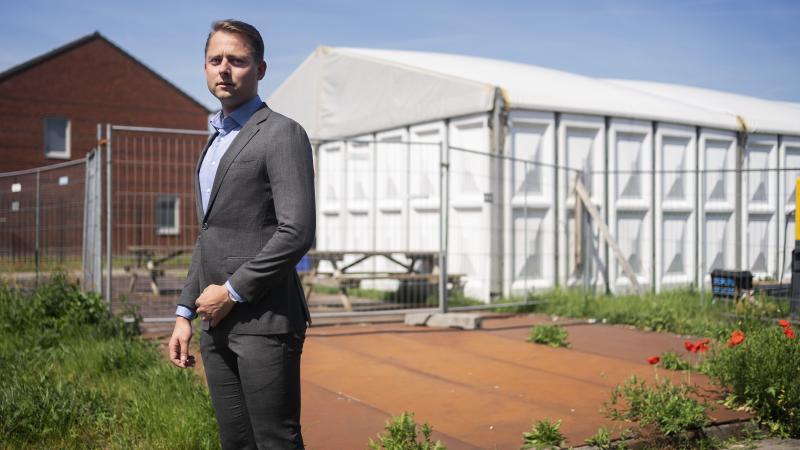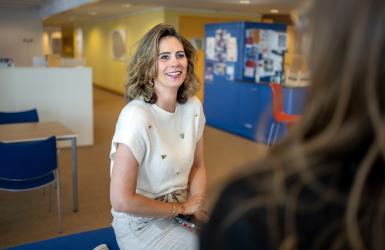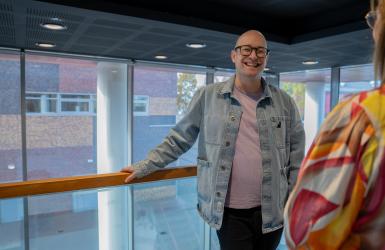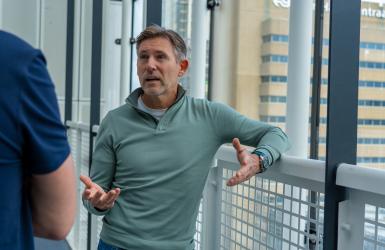The story of Evelien, staff adviser Human Resources (HR)
'Healthy and happy staff' When Evelien joined the IND in 2016, she only planned to spend two years here to gain experience.…

The application centre is bulging at the seams and families with children were forced to sleep on the floor. This touches me. I work for the IND because I believe every person has the right to safety and protection.
For months, the IND has been faced with a growing influx of asylum seekers. Because of this, the backlog of asylum applications that need to be processed is increasing. ‘The influx is currently higher than we had expected and calculated,’ Alvin tells. After 5 years at the IND, the tactical manager knows perfectly well that the asylum influx is capricious. ‘It depends on all sorts of developments in the world. Since last summer, a number of things have coincided. For example, delayed migration started to flow after corona measures and travel restrictions had been lifted. The influx of asylum seekers from Syria remained high. To this, the evacuation from Afghanistan was added. And now there’s a war in Ukraine. People who were staying there illegally must also report in Ter Apel.’
In Alvin’s view, the current problems in the asylum system are mostly caused by inadequate throughput. He says: ‘Currently, processing applications in time is not the biggest problem. People who have already been granted a status keep occupying beds in reception centres and emergency facilities because houses or other reception locations are simply not becoming available. For this, we can’t just point fingers at the local council of Ter Apel or the COA. They’re working round the clock. People must become aware that asylum belongs to us all.’
By far, most people who come to Ter Apel for asylum have fled from dire straits. ‘Just like last autumn, we’re currently being confronted with poignant scenes,’ says Alvin. ‘The application centre is bulging at the seams and families with small children were forced to sleep on the floors of our offices and waiting rooms. I work for the IND because I believe every person has the right to safety and protection. And their own bed. I am working hard for this every single day. Seeing these refugees, the frustration when they can’t be helped further… it touches me on a human level. It feels wrong.’
If Alvin could change something about the asylum problem in the Netherlands, a joint approach would be at the top of his wish list. ‘As a tactical manager, my primary role is to build a bridge between the political reality in The Hague and the implementation on the shop floor. I want to create awareness of the situation in Ter Apel. Make it known what’s going on and what’s necessary. It would be great if the Netherlands tackled this problem together. The central government, local governments, implementing organisations, everyone.
The IND is currently busy processing the ongoing asylum applications. ‘And we’re catching up with last autumn’s applications,’ says Alvin. ‘But we must also look ahead. Applications that are being made now will require a decision next year. And there are quite a lot of them. That is why we’re already looking for new colleagues who can come and help us in the interview and decision process. We still need around 150 to 250 people nationally. At least 45 in Ter Apel.’
However, extra capacity is not the only solution. The manager is also aware of this. ‘We’re continuously busy organising our processes better and more efficiently. For example, people coming for asylum reunification have recently been coming to Zevenaar for their appointments – to unburden Ter Apel. Thanks to IT improvements, our staff can work from home more often, which lowers the threshold to work for Ter Apel. And in the meanwhile, we are looking for a second location in the Netherlands where we can organise the ‘spontaneous’ influx process: a second application centre. However, it won’t be a surprise that finding such a space is complicated. This is something we have to deal with together.’

'Healthy and happy staff' When Evelien joined the IND in 2016, she only planned to spend two years here to gain experience.…

‘A single conversation can change someone’s day, week, or even their life’ Anyone who contacts the IND with questions about an application, a residence permit, or…

‘I translate wishes into practical solutions’ Marco initially started working at the IND as a self-employed person, but he quickly felt at home…